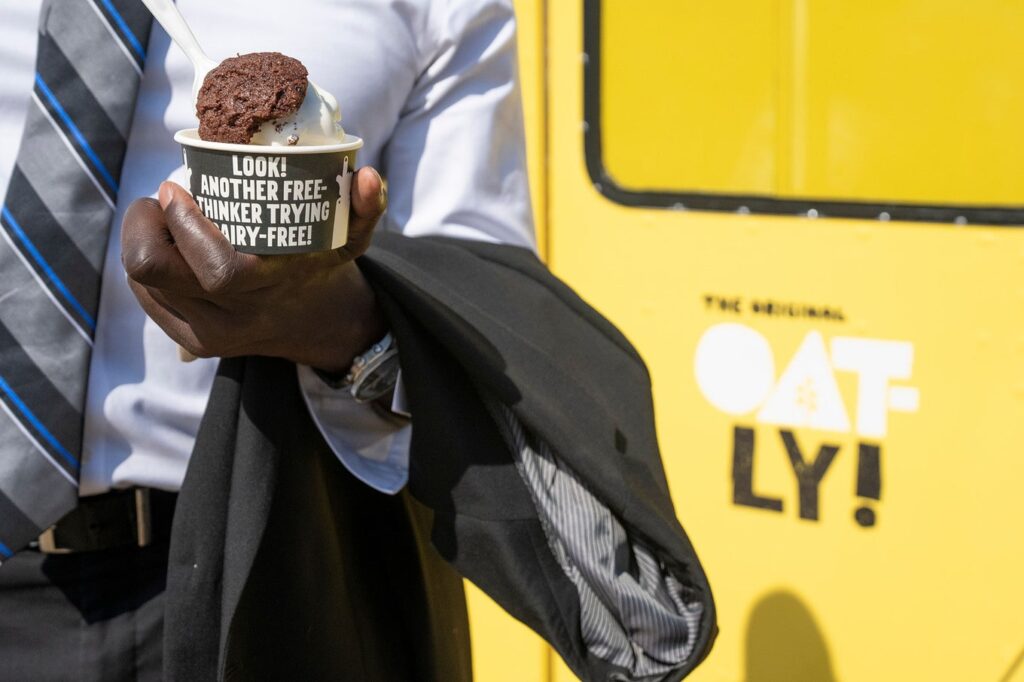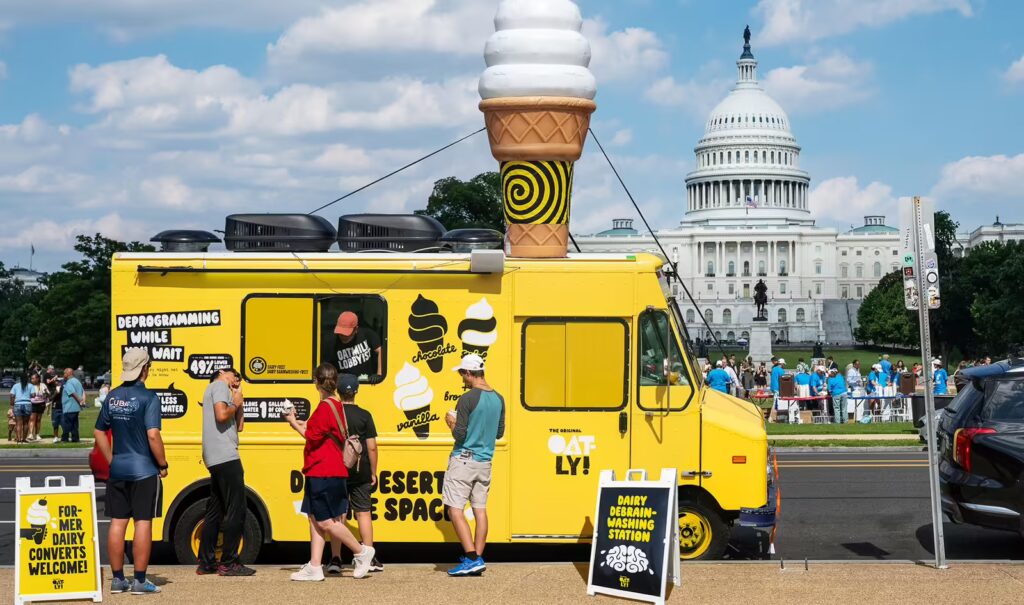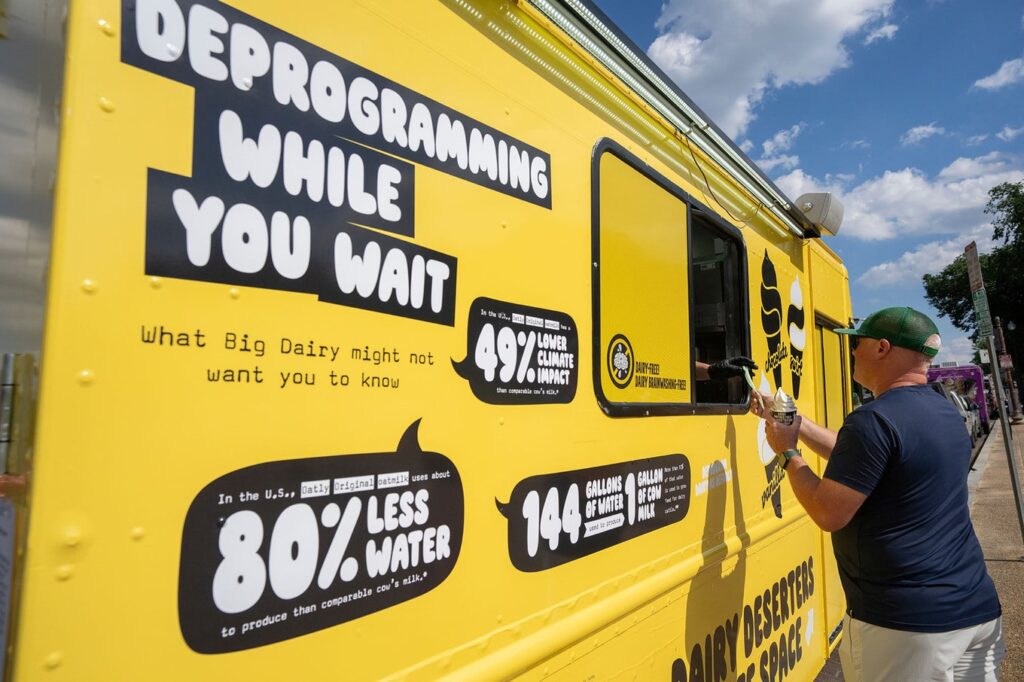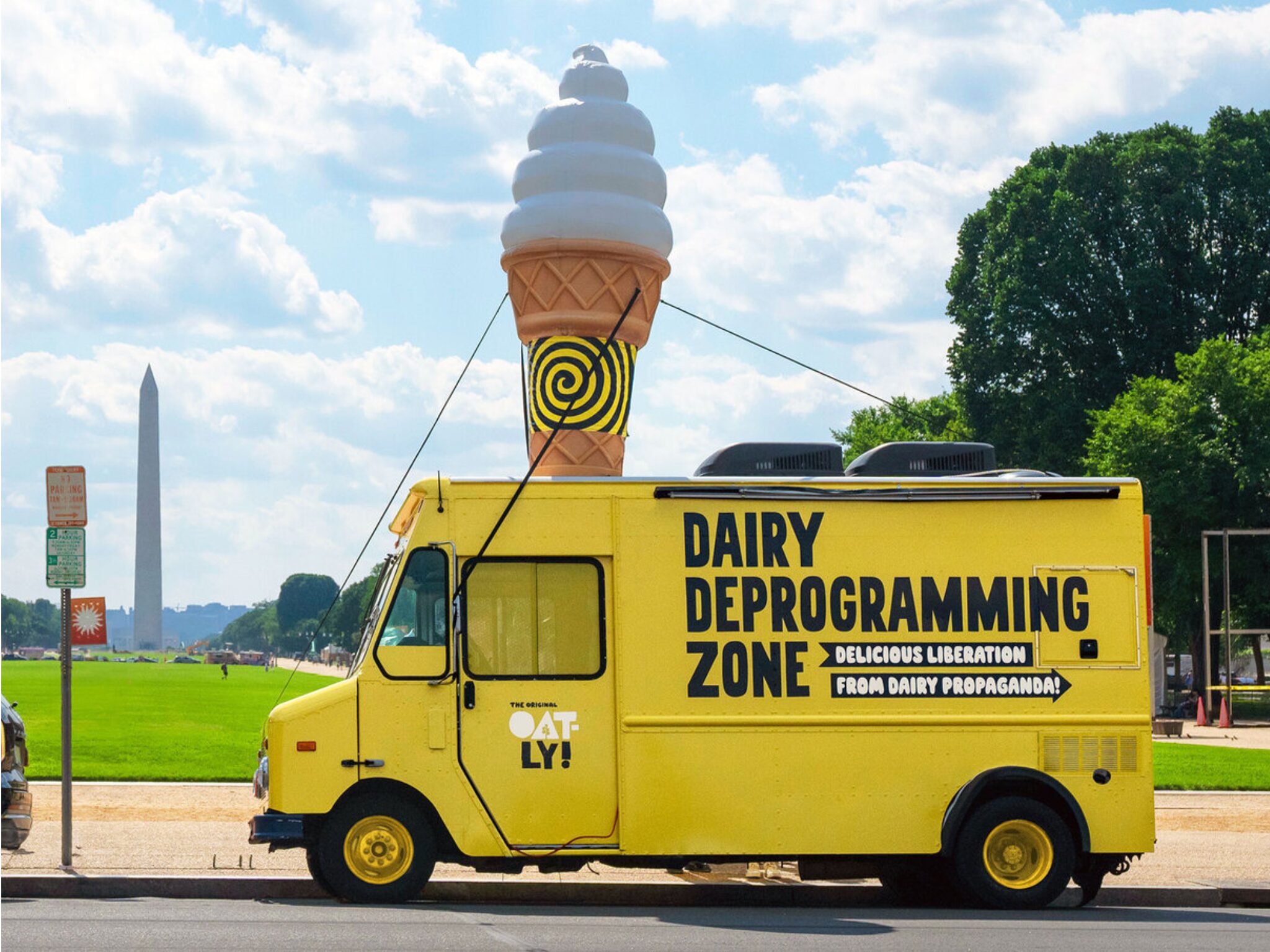Dairy Deprogramming: Oatly Crashes Big Dairy’s Ice Cream Party on Capitol Hill
4 Mins Read
Swedish oat milk giant Oatly set up a soft-serve truck next to a legacy ice cream event hosted on Capitol Hill to raise awareness about Big Dairy’s role in the climate crisis.
As Americans walked up to Capitol Hill for some free ice cream last month, an unexpected van was parked across the street, ready to spoil the party.
Dubbed the Dairy Deprogramming Zone, the yellow truck belonged to Oatly, serving as an alternative to the International Dairy Foods Association’s (IDFA) 40th annual Capitol Hill Ice Cream Party in Washington, DC (June 12).
Marked with statistics about Oatly’s climate credentials, the truck was dishing out Oatly’s plant-based soft-serve and offering “delicious liberation from dairy propaganda” during what was the National Dairy Month.
“We showed up on Capitol Hill to expose the decades-long influence by Big Dairy on our government and, in turn, the American people,” said Pearson Croney-Clark, public affairs manager for the oat milk giant. “The negative impacts of the dairy industry on our climate are significant and can’t be ignored.”

Fighting the dairy checkoff
Oatly’s move was a direct response to the National Dairy Checkoff programme, an industry-funded initiative that charges dairy farmers levies that go towards promotional efforts, research and nutrition education related to dairy products.
Between 2016 and 2022, the programme spent $1.6B on marketing, shaping public perceptions of dairy’s environmental impact, and at times overshadowing scientific facts that call for reduced dairy consumption to meet our climate targets.
The bright yellow truck was populated with facts that underlined the climate footprint of the dairy industry, noting how producing a gallon of milk in the US requires 144 gallons of water – 93% of this water is used to grow feed for cattle. In comparison, Oatly’s Original oat milk needs 80% less water to produce in the US, and has a 49% lower climate impact.
The truck stood out against the backdrop of the IDFA’s event, topped with a large ice cream cone wrapped in a hypnosis-like label to depict “brainwashing” on the part of the dairy sector. Doubling down on this, the truck featured the phrase “deprogramming while you wait”, with ice cream cups labelled “Look! Another free-thinker trying dairy-free.”

“Moving away from meat and dairy is one of the easiest ways Americans can lower their climate footprints, but because the dairy lobby is not transparent about the impacts of their products, many people don’t understand the true role that the industry plays in our climate crisis,” said Croney-Clark.
Matthew Glover, co-founder of Veganuary and British plant-based company Vegan Food Group, has previously revealed that he’s working on a checkoff programme for the vegan industry with Indy Kaur, founder of vegan consultancy firm Plant Futures, which will take “best practices from the meat and dairy industry”.
“We are looking to level up with this, consolidate funding and create a campaign which can fairly compete and give consumers a reason to choose to eat plants and not animals,” he told Green Queen in February.
Oatly calls for dairy carbon footprints
Oatly – a brand known for its bold, unconventional marketing – has been stepping up its efforts to tackle greenwashing and carbon transparency.
Livestock accounts for 31% of the US’s methane emissions, thanks largely to beef and dairy cattle. “Science clearly shows that to achieve the greenhouse gas reduction targets set by the Paris Climate Agreement and President Biden’s commitment to the Global Methane Pledge, consumption of industrially produced meat and dairy must decline,” Croney-Clark said.
Last year, it made a big splash after calling on the UK dairy industry to introduce mandatory carbon labelling on product packaging. To support the effort, it offered free ad space to dairy producers in the UK, challenging them to display their carbon footprint next to Oatly’s on a billboard.
The Capitol Hill ice cream stunt was an extension of that, marking the oat milk maker’s intention international ambitions with this campaign. “We put our climate footprint number right on the front of our packaging, and we’re calling on dairy companies as well as all other food companies to do the same. This would allow Americans to make educated and informed decisions about the impact of their food choices.,” said Croney-Clark.

“We must shift our food system now to protect the health of our planet and everyone on it. Through our Dairy Deprogramming effort today and our call for climate labelling on food packaging, we’re working to give Americans the transparency they deserve.”
Fellow oat milk brand Minor Figures (based in London), similarly launched a Dairy Disloyalty campaign in six US cities, encouraging coffee drinkers to switch to plant-based milk in participating cafés, rewarding them with bowling shirts and one grand prize in the form of a customised La Marzocco espresso machine.
North America makes up 34% of Oatly’s revenue, which was up by 9.7% year-over-year in the ambient section in Q1 this year (chilled sales also rose by 1.5%) in this region. This was thanks in part to Oatly’s new Super Basic and Unsweetened oat milk SKUs, a four-strong line of coffee creamers, as well as a partnership with Minor League Baseball.



